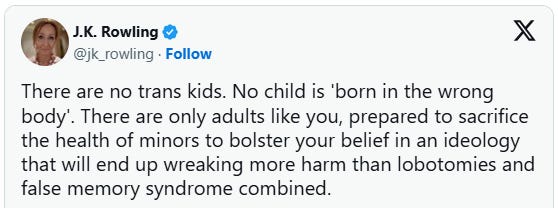A hat trick for sex realism
April in NZ has been a good month for confirmation that there are only two sexes.
Language matters
Much of the power accumulated by those who believe in gender identity has been based on their success in overturning the common meanings of words and denying or dismissing all of the inevitable negative consequences.
Children have been taught that sex is not biological or innate and they can change their sex at whim.
Everyday language relating to women and mothers has been upended in favour of dehumanising and insulting language such as: ‘birthing person’, ‘uterus-haver’, ‘chest-feeder’, or ‘person who menstruates’.
Women have been cheated out of medals, awards, and prize money by men who have self-identified as women.
After years of effort from campaigners for women’s and children’s rights and dignity, at long last, some politicians in NZ are beginning to see the harm that has been caused by our language being so malignantly contorted to suit the beliefs of a small minority.
Relationships and Sexuality Education
The first win was when NZ First negotiated in the Coalition Agreement in November 2023 for the transgender-riddled RSE curriculum to be withdrawn and rewritten. It took until March 2025 for that promise to be kept but, finally, it has been.
On April 11, the Ministry of Education released a draft framework for the proposed new curriculum in RSE, and opened it to public consultation. Here is RGE’s analysis of the draft, with suggestions for your feedback, and a link to submit.
Consultation is open until May 9.
A word search of the draft framework, thankfully, shows no mention at all of ‘identity’, ‘gender identity’, ‘transgender’, or ‘gender diverse’. No longer are our kids going to be confused and alarmed by this extremist language that tells them they are only ‘truly’ a boy or a girl if they fit into the stereotypes of that sex.
It’s too soon to relax, though - we need to keep our eyes peeled for other imprecise language in the framework that might provide an opening for gender identity beliefs to continue to be taught:
inclusion / inclusive (Years 4-6). We all want children to be included by being supported and encouraged to fully participate in school. But ‘inclusion’ does not mean children must be included into the categories to which they do not belong.
individuality (Year 4). Encouraging children to be themselves does not mean telling them that they must really be the opposite sex because they have interests that don’t conform to the stereotypes for their sex.
diversity (Year 5). Teaching children to “respect and appreciate diversity” must not morph into teaching them that people who are non-conformist to stereotypes have literally changed their sex.
gender /gender stereotypes (Years 4 on). We need to talk about sex stereotypes and the limits they place on both sexes from leading the lives they choose. Sex stereotpyes are harmful, especially when children are led to believe that how well they fit into the stereotypes is what determines their sex.
Precise language matters in RSE and children deserve to be given truthful information about their bodies and each sex’s distinct reproductive functions.
Only women can be pregnant
The second win for reality in April was when Associate Health Minister, Casey Costello, directed Health NZ to stop saying ‘pregnant people’. "Recent documents that have reached my office from the Ministry of Health have referred to women as 'pregnant people', 'people with a cervix' or 'individuals capable of childbearing'," she said.
Costello’s directive to use clear language to “ensure that women know what health services they are entitled to and can access these easily”, comes at just the right time to inform the consultation being currently undertaken by the Midwifery Council into its new Scope of Practice (SOP).
The SOP is the legal framework under which midwives practice. It defines the midwifery role and establishes the professional standards that a midwife is measured against, should there be any complaints.
In another example of the ideological takeover of our common language, the new SOP completely replaced the words ‘woman’ and ‘mother’ with ‘whanau’, as if gestating a baby is a collective enterprise. 7000 people signed a petition opposing the changes, citing the negative effect the vague and ambiguous language would have on quality healthcare for women and babies, not to mention the insult to women of excluding them from the most female of all experiences.
In March, Parliament’s Regulations Review Committee directed the Midwifery Council to rethink the SOP and then put it out for further consultation. Instead of reinstating the words ‘woman’ and ‘mother’, the Council has doubled-down on its use of ‘inclusive’ language (that excludes women) and has made only minor adjustments to the wording, which now reads, “The primary obligation of a kahu pōkai | midwife is to provide whānau-centred care for individuals (however they may identify) who are capable of childbearing and who are preparing for pregnancy, pregnant, birthing, and post-partum up to six weeks.” [Emphasis added]
Use this link to participate in the SOP consultation (Click through to the 21 questions): https://www.surveymonkey.com/r/DJSB2H9
Consultation is open until May 5.
"Only women and people of the female sex can get pregnant and birth a child no matter how they identify." (Casey Costello)
Defining ‘woman’ and ‘man’
The third strike for the hat trick was the introduction to Parliament on April 22 of a Private Member’s Bill by NZ First MP, Jenny Marcroft, that will define ‘woman’ in law as an “adult human biological female” and ‘man’ as an “adult human biological male”.
“This definition will apply in all contexts where the terms ‘woman’ and ‘man’ are used, unless explicitly stated otherwise in specific legislation,” said a statement from NZ First. (The Bill is in the ‘biscuit tin’ ballot and will not come before Parliament unless it is selected by chance.)
The Bill comes hard on the heels of the the UK Supreme Court decision of April 16 that confirms that single-sex spaces preserved for women are for biological women, not those self-identifying as women.
Sex Matters has produced an easy to read summary of the judgement and practical advice for its implementation that would be an excellent resource for any principals who want to ensure they have school policies that treat all children with dignity.
Remarkably, in this confrontational interview on Morning Report on April 23, Winston Peters said he wants the proposed new legislation to replace the sex self-ID law that was passed in 2021, when NZ First was not in Parliament.
Report card for the Minister
In December 2023, RGE sent the new Minister of Education, Erica Stanford, a briefing document with a list of actions she needed to take to remove gender ideology from schools. Although Stanford has been frustratingly slow to start, several of the items on the list can now be ticked off. We asked for:
an immediate halt to the use of the RSE Guide in schools. ACHIEVED
a panel with broad membership from a cross-section of society, to better
inform the development and content of the new guidelines. ACHIEVED by way of public consultation - make sure you participate via the link above.
the educationalists nominated to be in the writing group for the new guidelines to not all be supporters of gender ideology as they were in the 2020 revision. ACHIEVED - there is no mention of ‘gender idendity’ in the draft framework.
a timeline for the new Guide and the scope of the review to be clarified. ACHIEVED - a new draft curriculum will be open for consultation in Term 4, trialled in 2026, and operating in all schools from 2027.
the Curriculum Levels in the RSE Guide to be replaced with Year Levels so that parents can more easily understand what is being taught to which age group. ACHIEVED
education jargon to be removed from the guidelines so that parents can more easily understand what is being taught. ACHIEVED
a model for meaningful community consultation about RSE to be advised to put an end to the practice of tick box consultation. STILL UNDER CONSIDERATION
Outstanding targets
Despite the encouraging progress, the Minister’s work to disentangle transgender beliefs from education still has a very long way to go. RGE also asked for:
the Ministry to rescind the label of ‘trusted organisations’ that was given to InsideOUT, Rainbow Youth, and Gender Minorities Aotearoa (along with large sums of government money) by the previous Minister, Jan Tinetti.
school policies and practices to be rewritten to ensure they uphold the provision of single-sex spaces and sports and protect the rights of children, parents and teachers to hold and express personal beliefs.
the Minister to call an immediate halt to the use of the Mental Health Guidelines in schools, which are based on the same harmful ideas as the RSE Guide.
the Ministry to conduct an urgent inquiry into social transition and its harms, with best practice policies to be issued to schools.
The ball has started rolling, it is now up to parents and teachers to continue the momentum by speaking up in support of the positive changes, wherever you can.
Learn about the draft RSE framework.
Remind friends and family to make a submission.
Write to your principal and Board of Trustees to provide your point of view.
April breakthrough in Australia
In another April breakthrough, a Family Court judge in Australia ruled against a mother’s request to begin giving her 12 year old son puberty blockers, instead granting custody of the child to his father. The judge emphasised that the child is too young to fully understand the long-term consequences of such a significant decision.
“At this stage in the child’s life, all options should remain open, without the risk of harm,” he wrote, adding that medical decisions should be made in the best interest of the child, not influenced by ideological beliefs.
“In his 58,000-word decision the judge delivers a series of hammer blows to the dogmas of the “gender-affirming” treatment approach,” says Bernard Lane. Read Bernard’s full report of the ruling here, on the Gender Clinic News substack.








This is a great achievement so far. But we can't stop at a hat trick! Number 4 on my wish list is the repeal of the amendment to the Births, Deaths, Marriages, and Relationships Registration Act 2021 that allows a person to legally change their sex on their birth certificate, and then to reinstate all birth certificates to correctly indicate the biological sex of the person.